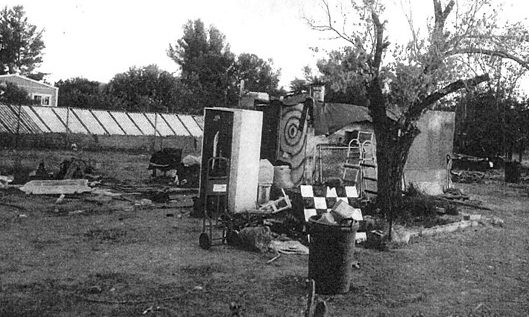On Wednesday, the US Supreme Court heard oral arguments in a case centered around liability for an officer-involved shooting in which Los Angeles County Sheriff’s deputies were accused of provoking the violent encounter.
On October 1, 2010, Members of the LASD’s Community-Oriented Policing Services High-Impact Team (COPS HIT) reportedly entered a backyard shack where Angel Mendez, 30, and Jennifer Garcia, 27, were living. Mendez and Garcia were not suspected of any crime, but the sheriff’s department says it had received a tip that an AWOL parolee might be found in the vicinity of the property.
The COPS HIT deputies, Christopher Conley and Jennifer Pederson, reportedly smashed through the door of the backyard shack without a warrant, and without knocking, identifying themselves, or even calling out.
One deputy saw Mendez holding a gun, which later turned out to be a BB gun. Two of the officers fired fifteen bullets at Mendez and Garcia. Mendez, who was shot multiple times in his back, side, leg, and arm. The man was critically wounded and ultimately lost his leg. Garcia, who was five months pregnant at the time, was shot in the back. (She later delivered a healthy baby.)
The deputies argued that the building did not appear inhabitable. The district court found that the officers could not “reasonably” have believed the shack to be uninhabited, as there were signs the structure was occupied, including an air conditioning unit and a clothes locker. In addition, an officer testified that he told the deputies that a man named Angel and his pregnant girlfriend lived in a shed in the backyard.
LA County and the two deputies appealed a $4 million award to Mendez and Garcia. A district court ruled that the COPS HIT deputies violated Mendez and Garcia’s Fourth Amendment rights when they entered the shack without a warrant, and without knocking and announcing. The court said that law enforcement officers must knock and announce their presence before entering a second residence, even if they have announced themselves at a different residence on the same property. The district court also found that deputies violated the 9th Circuit’s “provocation” rule, which revokes legal immunity from members of law enforcement who use force, in cases where the officers provoked violence.
The 9th Circuit Court of Appeals agreed that the deputies initiated “a situation which led to the shooting and required the officers to use force that might have otherwise been reasonable.”
The appeals court found the deputies liable “under basic notions of proximate cause.” The court found that the officers’ failure to obtain a warrant proximately caused the shooting.
The deputies involved argue that the appeals court’s provocation rule conflicts with Fourth Amendment jurisprudence that takes into account the reasonableness of a use-of-force at the moment the officer takes the action. The deputies and their legal team also said that the provocation rule conflicts with the qualified immunity doctrine, which protects law enforcement officers from being sued for actions that don’t violate clearly established constitutional or statutory rights. The court ruled that the Fourth Amendment’s requirement for a warrant was clearly established. The appeals court also ruled that the second “knock and announce” on the shack was not a clearly established right, as the deputies had already announced themselves at the house.
SCOTUSblog’s Rory Little called Wednesday’s Supreme Court argument in County of Los Angeles v. Mendez, “unsatisfying.”
The justices appeared divided on the issues, and Little suggests that the justices may come back from their private conference this week evenly divided—an extremely rare outcome. A tie would affirm the Mendezes’ $4 million award.
Justices Sonia Sotomayor, Elena Kagan, and Stephen Breyer made comments that appeared to suggest the deputies should have foreseen unlawful entry causing a violent confrontation.
“The question is when does the police officer pay the victim who is suffering for that loss if the victim had nothing to do with causing the loss…or was justified in whatever he or she did to protect themselves?” Justice Sotomayor asked.
Arguing for LA County, attorney Joshua Rosenkranz stressed that the deputies’ failure to knock and announce is assumed to not violate clearly established rights. Justice Kagan then asked whether the action should be viewed as a Fourth Amendment-violating “unauthorized entry,” which would support the Mendezes’ damages.
Justice Samuel Alito argued that the officers’ failure to get a search warrant “did not cause the entry.” Justice Anthony Kennedy seemed to agree, saying, “I just don’t see the proximate cause between the failure to get the warrant and what happened here.” Earlier in the argument, Justice John Roberts said he didn’t “think of it as a provocation that you should have gotten a warrant earlier in the day.”
For a more in-depth analysis of the argument and the complex case, head over to SCOTUSblog.
Photo credit: Los Angeles Sheriff’s Department


Headline…”SCOTUS overturned decision buy 9th Circuit”. Not surprising, but refreshing to see a reasonable decision being made in this political climate by an unbiased court. However, I do wonder what the decision would have been under a different political regime. Maybe a foreshadowing of future 9th Circuit cases under review by the SCOTUS.